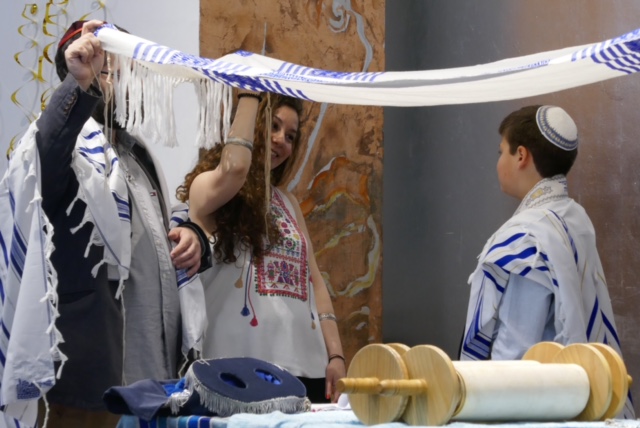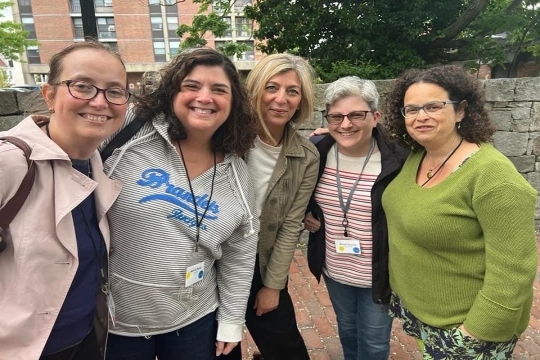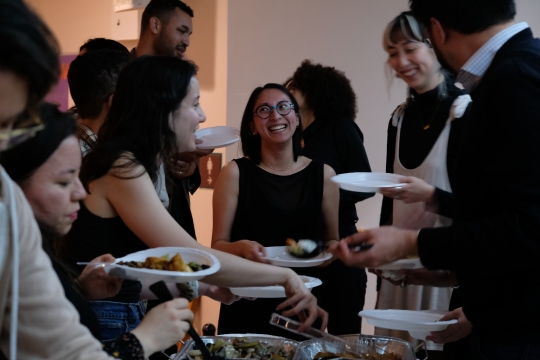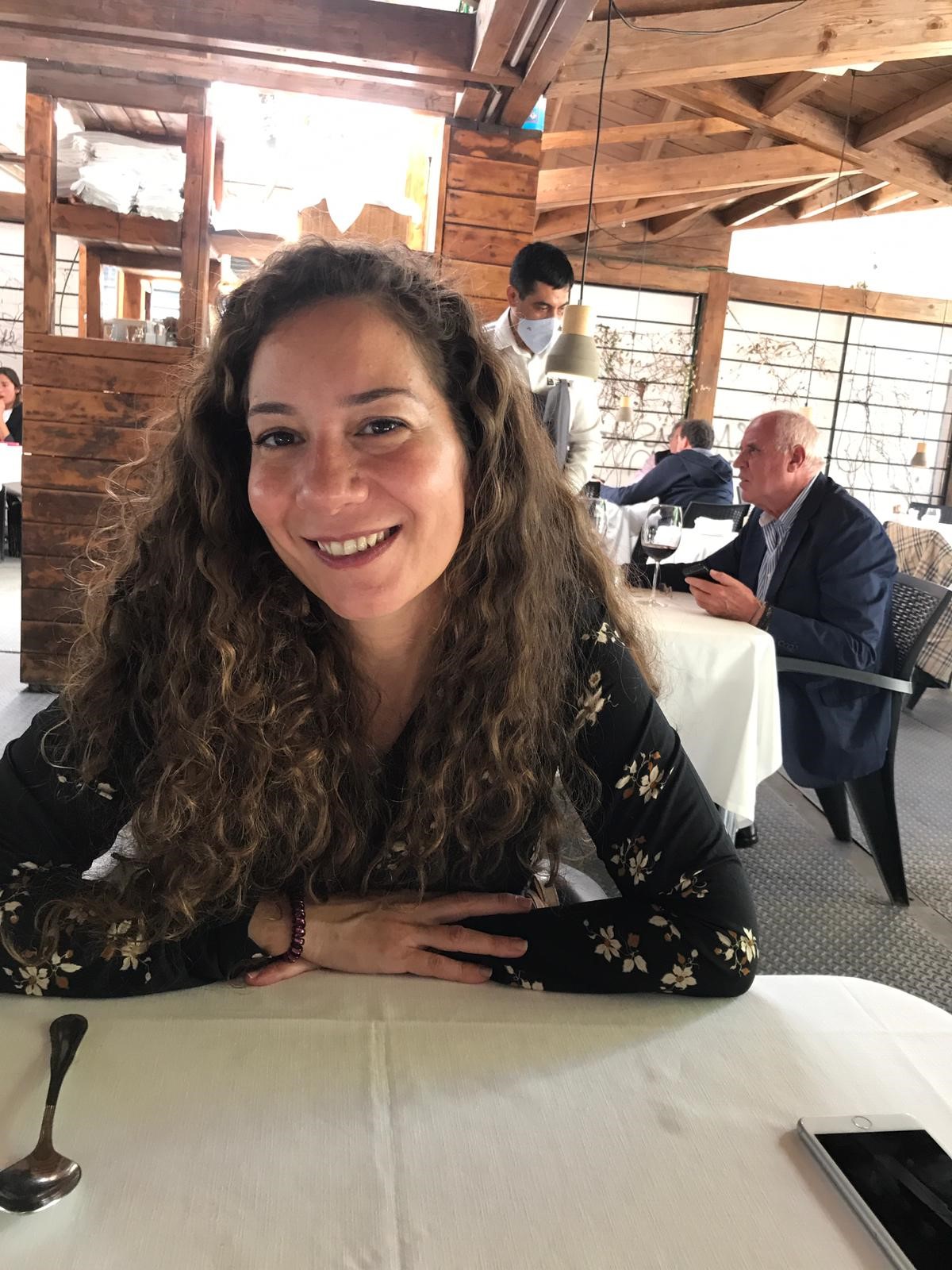
The first time I personally connected with Women of Reform Judaism (WRJ) was in 2015 at the URJ Biennial in Orlando where I was invited as their guest. I already knew about their spirit and how the organization was driven by its mission. It was there that I saw their vision and devotion to sisterhood and activism. Living that experience influenced me in a positive way.
At that time, I started to follow WRJ and all of its initiatives. By analyzing them, I learned where the focus of the world's Jewish collective action was, and WRJ acted as a model, for me, as an action-oriented women's organization.
Two things increased my appreciation of WRJ. First, despite being a North American-based organization, WRJ is not exclusionary. They admit members from other world regions. Secondly, WRJ focuses its activism not only within their local communities but also on world Jewry, whether in Israel, Europe, or South America. This speaks to a broad and committed vision of impact.
That experience in 2015 left me with enthusiasm to grow an emerging Reform Jewish community that I founded with others in Madrid, the first in the city. Since then, nothing has been the same.
I continue to follow WRJ's priorities and action items each year. One of the initiatives they support is scholarships for students in Reform rabbinic training institutions around the world, including my own, the Ibero-American Institute for Reform Rabbinical Education (IIFRR), where I am a fourth-year rabbinical student.
There is usually an enthusiastic response when someone finds out that I am studying to be a rabbi, but that response is always followed by a series of questions. Are you studying in Spain? Is there a rabbinical seminary in Spain? Of course not, I answer! Not only because Spanish Jewry does not yet have a considerable contemporary historical background, but also because there are not yet, important resources in Spain. When pursuing rabbinical studies, we have traditionally turned to Europe, to institutions that I respect very much, such as Leo Baeck College in London, Abraham Geiger College in Berlin, or a new rabbinical seminary in France; or we've crossed the Atlantic, to Hebrew Union College in the U.S. However, my native language is not spoken at any of these institutions. While I can express myself in other languages, speaking in one's own language matters.
Thanks to the creation of the IIFRR five years ago, I can study in Spanish, as well as Portuguese, and Hebrew. This is truly priceless. Studying with colleagues from Latin America and Europe in my own language is a privilege that I am very grateful for. Despite our own differences in each country or region, including linguistic differences with our beloved Brazil, the difference in thought and expression is anecdotally rich and familiar. Clarice Lispector and Caetano Veloso, Mercedes Sosa and Jorge Luis Borges, Gabriela Mistral or Cervantes and his Quixote, are the writers who unite us and help us share idiosyncrasy and common heritage.
In terms of vision and commitment, WRJ and IIFRR have a lot in common. I see the same qualities in the IIFRR as I did in WRJ, another organization that could have stayed local but decided to take its vision further. Having the choice to just focus on Spanish-speaking countries or on other parts of Latin America, the IIFRR understood that there is a shared vision not only within the continent but beyond. They extended their reach across the Atlantic in the Institute's mission of finding commonalities towards the south of Europe where, in many communities, Reform Judaism has not yet had a chance to grow and prosper.
I love the partnership between WRJ and the IIFRR, and I love that this happens while both organizations share in their commitment to support people like me: a woman, who is liberal, in the south of Europe, where Reform Judaism has a future because it embraces the realities that are given with the seriousness they deserve, and where it is time for there to be female Rabbis. This is already happening in neighboring European countries, but not yet in Spain.
The next question I usually get asked is: If the IIFRR is based in Buenos Aires, Argentina, how do you study? My answer is that I study online, and virtual learning is not an inconvenience. Some may think that we miss out on the joint experiences that arise from in-person, face-to-face teaching, but this model does not sacrifice educational quality. In fact, it allows each of us to continue our jobs and the ability to deal with family and personal situations, all while learning and participating in our local communities. We tend to think that each kahal (community) is different, but in most cases, I have observed that we are not so different, thereby making the process of acquiring knowledge and learning from the experiences of others a fruitful experience no matter how different our birthplaces may be. While we receive training, we continue working on the local level, so what we learn and experience can go directly back to impacting our communities.
You might think that because I am so passionate about my experience that I don't see any negatives. The part of my educational experience that requires extra effort from me is my schedule. I study into the early hours of the morning. It could be seen as not a big deal, but in the context of modern lives, with demanding schedules, it is something that I always need to manage. However, there are numerous instances in the Torah about studying at night that offer some food for thought. "Have a designated time for Torah study, both during the day and at night, for it is said: But you shall meditate on it day and night" (Joshua, 1.8.) Mishneh Torah, Talmud Torah 1:8; or "one who wishes to merit the crown of Torah should make sure that he does not waste a single night by indulging in oversleeping, eating, and the like." Hilchot Talmud Torah 3:13. And my favorite one, the Talmud teaches, "One who studies Torah at night, a thread of loving-kindness is drawn over him during the day." Avodah Zarah 3b.
As I reflect on the teachings of the Torah, keep kvetching a bit as a therapy, and benefit from the sources of loving-kindness I have during the day, I continue to feel blessed and enjoy every hour of study in this great initiative of which I am already part of. It is a privilege to be on this journey in the service of my people, along with WRJ's support through the YES Fund, in the language in which I was born.
Related Posts

“How good it is — when sisters dwell together!”

LUNAR: Simply Remarkable - An Ongoing WRJ YES Fund Partnership
75d5.jpg)

